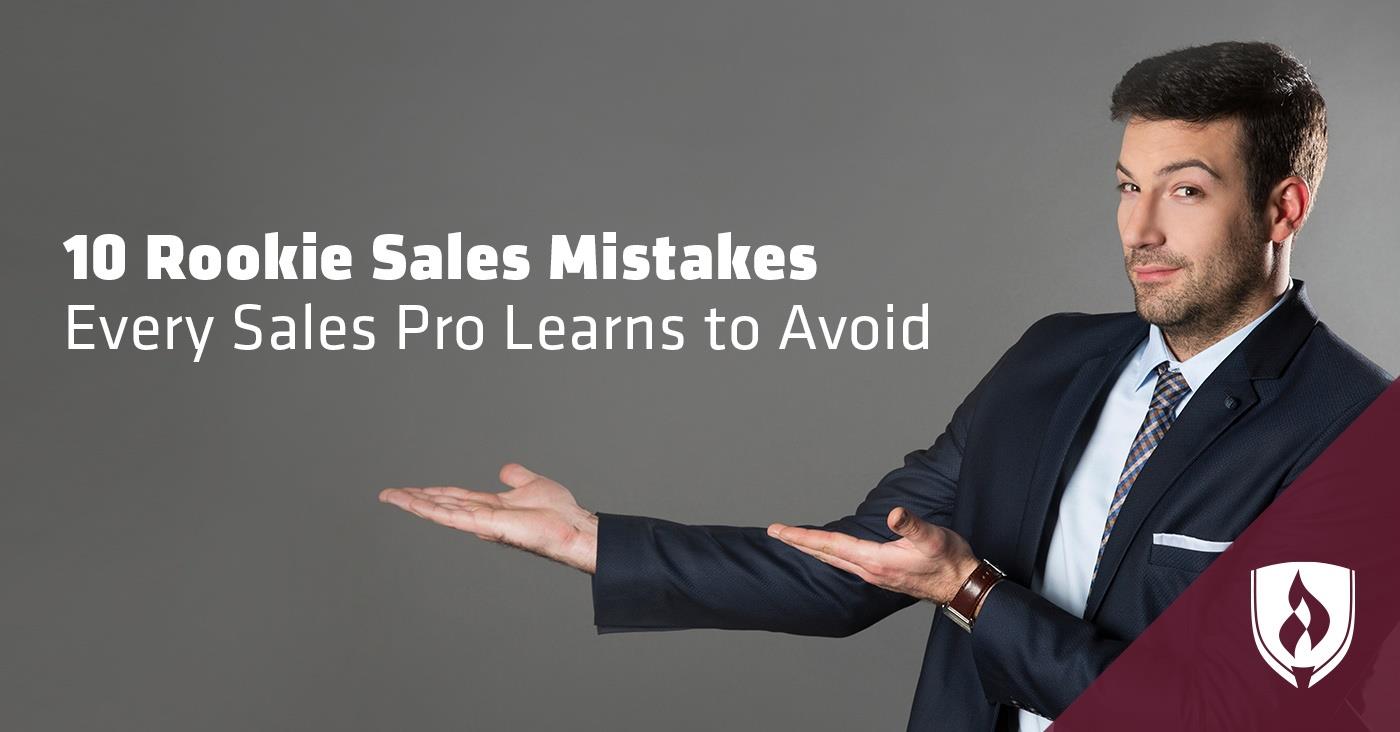10 Rookie Sales Mistakes Every Pro Learns to Avoid
By Will Erstad on 08/29/2018
“Newbies,” “greenhorns,” “rookies….”

It’s no secret that new people can be kind of bad at their jobs. They either come storming in with baseless confidence, ready to change the world, or they need an abundance of hand-holding to get through the basics of the job.
In sales, it can feel like up-and-coming professionals don’t always have as much leeway as new workers in other fields. The fact that many salespeople’s livelihoods are tied to earning sales commissions can make these rocky starts much more consequential.
With that in mind, many sales hopefuls are eager for a “career hack” that can help them skip a few steps and learn how to avoid some of the common blunders that have been known to hurt the chance of making a sale. That’s why we asked a handful of experienced sales professionals to share some of the common sales mistakes they’ve encountered and what a new salesperson can do to right the course.
10 Sales mistakes up-and-coming pros should avoid
Who better to learn from than those who were once in your shoes? Use this expert insight as your guide for what not to do when starting your sales career.
1. Neglecting the pipeline of prospects
While this can depend quite a bit on how the sales team you’re working for is structured, it’s an important one to remember if you’re managing an entire sales pipeline. Mike Smith, founder of SalesCoaching1, says that underestimating the amount of prospecting needed to be successful is a common mistake salespeople make when they’re starting out. “It is almost impossible to succeed without consistent and well-planned prospecting,” he explains.
Business isn’t always going to just come to you—you’ll have to put in the effort to make contact and let people know what you have to offer. And when you do have a few prospects interested, don’t let the excitement of a potential sale take up so much of your energy that you neglect to prospect for additional leads.
2. Speaking to the wrong people
Prospecting can be tough. You can expect to get rejected or outright ignored more times than you can count. With that in mind, it’s not surprising that new salespeople might get a little carried away when a prospect shows some interest. Before diving in with a pitch meeting, it’s important to understand that prospect’s decision-making authority.
While it might make for good practice and maybe help down the line to have someone advocating for your product, pitching to someone who doesn’t have the ability to make a purchase decision is not an efficient way to work as a salesperson. Do your research and don’t be afraid to ask how involved the person you’re working with is in the budgeting and purchasing process.
3. Talking too much, too soon
Salespeople spend a lot of time working to get a foot in the door for a pitch meeting and preparing for it. But don’t let the excitement of finally getting to make your pitch lead to an overzealous delivery.
Chetan Mahajan, 13-year sales veteran and owner of Himalayan Writing Retreat, says his enthusiasm to pitch was an early stumbling block. “I spoke too much and too soon,” he recounts. “I would go into a sales call and then launch into our product and its details very early without asking enough questions. This often turned customers off, and I just didn’t learn enough about them.”
4. Not asking where you stand
There’s a tendency in sales conversations to beat around the bush at times—often it’s spurred from a fear of having things fall through after working hard to make progress. “Salespeople often hesitate in asking questions about who else the customer is considering because they think the customer might find such questions intrusive or even offensive,” Mahajan explains.
While it’s not bad to be cautious, there are times when being direct can work wonders. If you think you have a strong enough working relationship with a prospect, Mahajan suggests subtly asking about your potential competition and what they think about how your offerings compare. “You may be surprised by how forthcoming customers can be about the options they are considering, and how you stack up,” he adds.
5. Losing sight of prospect budgets
You may believe your offerings are the latest and greatest in the market and that they’ll be the solution to your prospects’ needs—and they might agree! But sales need to be made in the real, not-always-ideal world where budget constraints and other factors may limit what a customer can feasibly purchase.
Will Craig, CEO of LeaseFetcher, says that failing to qualify his leads’ budgets was one of the biggest mistakes he made as a new salesperson. He says he’d spend hours learning about a potential client’s business and preparing a proposal only to be greeted with instant replies about how the proposal was way out of their budget range.
“If the potential client doesn’t have the budget for your service, any work you invest into the sale is worthless. No matter how good your sales technique, you aren’t going to increase a $200 budget to $20,000,” Craig explains.
6. Being over-scripted and too buttoned-up
There’s no doubt that a sales meeting is serious business and requires thoughtful discussion. But that doesn’t mean you should approach every meeting like a sales robot. Sacha Irving, CEO of Mavenli, says it’s common for inexperienced salespeople to come into meetings overly serious, “corporate” and scripted. “This never works, and it makes you come off as a boring person,” he maintains.
Instead of entering a sales meeting with a script of heavily rehearsed lines, try making a bulleted list of the things you’d like to emphasize. This will keep you from coming off as stiff. It also allows for much more natural conversations in which you can let a little personality show after you’ve read the attitude of the room. A little warmth or humor can go a long way toward building a better sales relationship.
7. Overemphasizing pain points
If you’ve done your research and asked the right questions, then you probably have a good understanding of what your target’s pain points are. That’s great information to have, but be careful not to overemphasize the issues they face. Irving contends that trying to point out the pain points too often can end up backfiring. “I thought I was doing my job; they thought I was insulting them for no reason,” he recalls.
For example, if you’re selling inventory management software and your target’s clearly having efficiency issues, it’s fine to point out how your software can help. But hammering them with repeated mentions of how inefficient their current process is can be a turnoff that puts them on the defensive.
8. Failing to ask good questions
Another common sales mistake is a reluctance to ask questions. Usually this comes from a place of not wanting to seem rude or pushy, but pointed questions can also boost your ability to make a sale.
“People love telling you about themselves, and, as a sales person, the more information you have on your prospect, the easier it is to sell to them,” Irving says.
If you’re unsure of the best way to approach asking these questions, try following the advice of professional question-askers: journalists. There are plenty of guides out there, but some solid advice from the world of journalism includes doing your research ahead of time, asking open-ended questions and, if necessary, employing a willingness to play dumb about certain topics.
9. Underestimating the impact of tone and body language
We’ve all heard the proclamation, “It’s not what you say; it’s how you say it.” It may be a clichéd statement, but there’s a reason it’s used so frequently. How you present yourself and the way you come across when speaking can have an outsized impact on your success.
“Tonality, enthusiasm and body language can literally get you 95 percent of the way to a sale,” Irving offers. Do everything you can to show up to sales meetings sounding confident, engaged and enthusiastic to help. It might not be easy when you’re first starting out, but just being aware of body language and your tone of voice will help.
10. Not slowing down
Getting a chance to finally pitch your products or services and potentially land a huge sale can really get your adrenaline flowing. Unfortunately the excitement and high of a pressure-filled sales meeting can cause inexperienced salespeople to start rushing through what they have to say.
“I believe salespeople can be so excited to tell their story or pitch their product that they talk fast and don't allow the customer to soak in the information,” offers Larry Medcalf. “When you talk fast, not only do people tend to think you're trying to get something past them, but they also won't typically understand the full message of what you have to say.”
Nerves are never an easy thing to tame. That being said, a conscious effort to practice speaking deliberately in your everyday life can help. Take a deep breath, pause at the end of your sentences and collect your thoughts before speaking.
Are you ready to sell like a pro?
Getting started in a sales career can be a bumpy ride—even the best salespeople have things go wrong and see their pitches flop. But now that you know some of the common sales mistakes that have sunk pros’ chances in the past, you’ll be well equipped to dodge these pitfalls in your own career.
Good advice isn’t the only thing that can help you be a better sales professional. If you’re looking for more ways to leverage yourself as a salesperson, then head over to our article, “9 Ways a Marketing Degree Can Help Boost Your Sales Career.”




